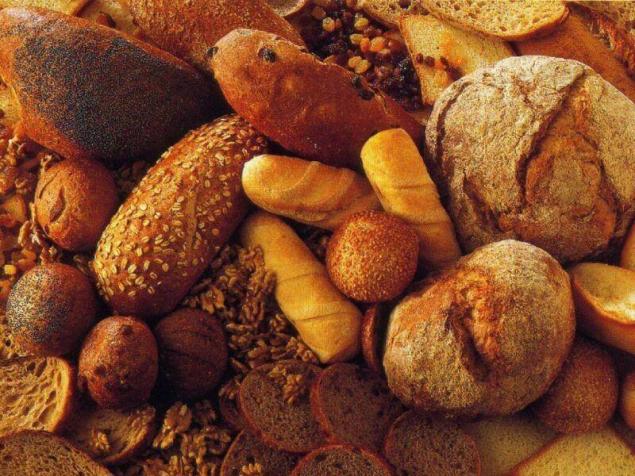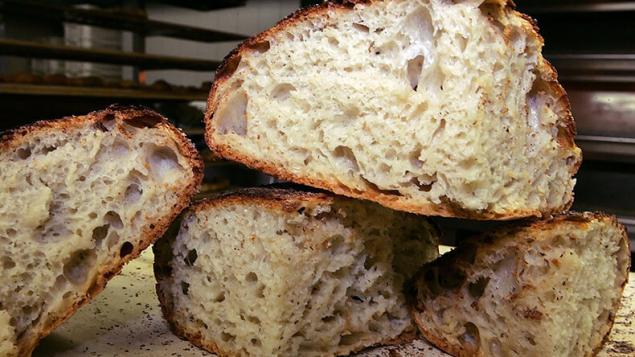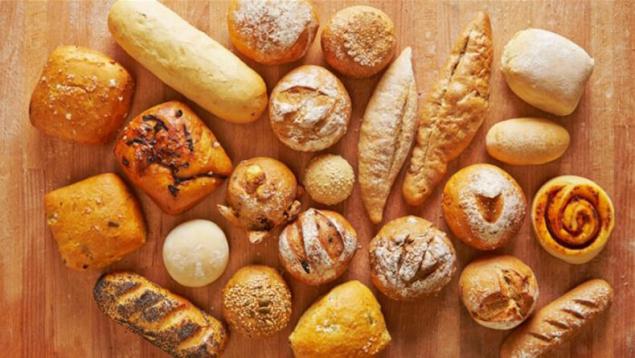723
Beware the bread! Communication with the mental illness of the digestive disorders
"Our daily bread Give us this day ... but deliver us from evil»
Matt. 6: 9-13
Bread - it's not just a food product, for many crops, including Russia - is a symbol of food, almost sacred character, which plays an important role in Christian mythology. At the same time, it is not the most wholesome food - if only because it mainly consists of carbohydrates, quickly raising blood sugar and lead to overweight and an increased risk of many metabolic diseases
. But that's not all the problems associated with the consumption of bread. Paola Bressan and Peter Kramer of the University of Padua - - collected and systematized scientific evidence pointing to the fact that the bread and other products of cereal crops may cause the development of mental disorders large review article, the authors of which recently Frontiers of Human Neuroscience journal has been published - from schizophrenia to autism.

At the same time, with the exception of bread and other foods can lead to a significant improvement of many mentally ill people, and in some cases - and to their full recovery. We have translated the basic provisions of this article (for simplicity, we did not carry here are numerous references to the sources used by the authors, visitors can easily find them in the original publication).
So how does this everyday and everywhere common product like bread could serve as a threat to our mental health?
There are two reasons:
Firstly, bread increases the permeability of the intestinal wall, which allows food particles get where they did not place. This causes the immune system response, attacking not only the particles, but also related to them related to the brain substance.
Secondly, the digestion formed bread related opiate substance. When injected into the brain, they can cause mental disorders.

Grains first appeared in the human diet about 12 thousand years ago in Mesopotamia region. Gradually agriculture spread across continents, and eventually for the majority of the world's population cereals became the basis of the diet. The advent of agriculture - farming and animal husbandry - to create conditions not only for the rapid increase in the number of mankind, but also for the development of civilization
. But in terms of physiological radical change of diet of hunter-gatherers to farmers diet has led to dramatic changes, people have become much less growth, decreased life expectancy, increased infant mortality, the spread of infectious diseases and bone and tooth decay. Despite the fact that the average height of people is constantly growing past 4 000 years, we are still 3 cm lower than our ancestors were before the advent of agriculture.
One of the first indicators that the bread may be associated with mental ill-health, was a sharp decline in cases of schizophrenia during the Second World War, in those countries where there was a severe shortage of grain. At the same time in the US, where in the same period, consumption of grain has increased, and increased incidence of schizophrenic disorders.
In addition, it was observed a drastic increase of schizophrenia cases in the islands of the South Pacific Ocean after their residents in the diet for the first time in their history became widespread bread:. 1 case per 30 000 people, up to 1 in 100 people
Now science has accumulated enough evidence to assert that approximately one third of humanity, have certain genetic features, as well as in connection with a number of other factors, such as certain viral infections, the bread can be dangerous and for the physical and mental health .
Herbs, grains and toxins
Cereals - the seeds of various herbs. Some of them are suitable for human consumption, some - not. But they all have security mechanisms of the full digestion, which helps to further reproduction of plants. In addition, plants themselves have different chemical ways of protection against eating. This protection - toxins that are present in sufficiently high amounts including cultivars grain
. Furthermore, seeds and contain the supply of food needed for germination. This stock many cereals - barley, rye and particularly wheat - is stored in the form of a particular protein - gluten or gluten. Gluten has one valuable feature - it forms an elastic adhesive mass, fastening dough and retaining gas bubbles produced by fermentation of yeast. It is because we can bake gluten soft porous bread.

Gluten is found not only in cereal products - from bread to beer. Thanks to its bonding and filling properties, it is used everywhere. A study of Australian supermarkets found gluten in almost two thousand food products - from sauces to sausages, and more than a hundred non-food products - painkillers tablets, shampoos, etc.
But with gluten related and health problems - for some people it is toxic, and the proportion of these people is growing steadily in recent decades. At the same time becoming increasingly common varieties of grains containing gluten most malicious versions. And besides, gluten causes quite specific reaction when released into the digestive tract of absolutely everyone, not just people hypersensitive.
Holes in the gut
Communication with the mental illness of the digestive disorder is known, at least 2000 years and is confirmed by modern scientific research. Postmortem examination of schizophrenics found that 50% of them suffer from inflammation of the stomach, 88% - 92% and thin - colon
. From the unhealthy bowel in our body can act harmful bacteria, toxins and undigested food particles. From this we should protect the intestinal wall, which must, however, keep water and nutrients. To do this, the body adjusts the space in between cells and intestinal permeability - a key role in this is played by the protein zonulin
. Sometimes this mechanism gives failure, the pathologically increased intestinal permeability and undigested food particles then fall into the bloodstream, causing an immune response. This is due to a number of diseases: asthma, diabetes type 1, arthritis, multiple sclerosis
. On intestinal permeability may be influenced by different factors. For example, psychological stress, which explains why many people have important public speaking can cause digestive problems. Furthermore, the permeability of the intestinal wall and modulated food we consume. For example, fructose, it increases, and bow and tea - reduce
. Gluten stimulates the production of zonulin and refers to products, making our intestines more permeable. In addition, gluten weakens another important barrier: between blood vessels and brain (blood-brain barrier). Once in the bloodstream, gluten can cause an acute reaction of the immune system.
Different forms of sensitivity to cereals
Hypersensitivity to cereals (hereinafter - gluten-free) can take many forms - from allergies and so-called "Asthma bakers" to celiac disease, occurring in approximately 1% of the population.
Celiac disease - is an immune response against the body's own intestinal cells. If you leave it unattended, and not removed from the patient's diet gluten-free products, then it leads to permanent damage of the intestinal wall and the deterioration in their ability to absorb the nutrients necessary for the body and brain.
Most people with celiac disease do not know about their diagnosis. 5000 Italian students study showed that 6 out of 7 cases were neprodiagnostirovany. This also applies to older patients. The average period between the onset of symptoms and diagnosis -. 17 years
The prevalence of the disease is growing quite rapidly: the number of patients in the United States over the past 50 years has increased by 4 times, in Finland - a twofold increase in 20 years. The disease is not necessarily manifested in childhood - it can also occur in adults
. Some people do not fall under the criteria of celiac disease, still feel a lot better on a gluten-free diet - this was confirmed by double-blind study with a placebo. Define a sensitivity to gluten free celiac disease can only be experienced by excluding gluten from the diet, since laboratory tests that do not yet exist. intestinal permeability in these people is normal, but gluten consumption greatly increases it. The symptoms they are experiencing are not often associated with digestion: these include headaches, eczema, fatigue and "blurred consciousness»
. Sometimes, however, the sensitivity to gluten confused with sensitivity to carbohydrates contained in the bread, but it is time, it is characterized only by problems with digestion.
Cereals and reason
Unfortunately, gluten is very similar to some related to the brain substance, and experiments have shown that antibodies to gluten are able to attack and a very important matter for us. For example, enzymes involved in the production of GABA neurotransmitter, dysregulation of which can cause panic attacks and depression.
Most of us manage to avoid unpleasant consequences only because of the blood-brain barrier, but only as long as it works properly. If this barrier is broken, then triggered by gluten antibodies can attack the brain and cause serious neurological dysfunction, regardless of whether sick people with celiac disease or not.
If grains can affect the brain, it is not surprising that they affect and mental health. Large epidemiological studies celiac disease linked to an increased risk of depression, psychoses, autism. Antibodies gluten found much more frequently among patients suffering from schizophrenia and autism than in healthy people. For example, one study showed the presence of these bodies in 87% of children with autism and do not receive special drugs, and only 1% of normal children.
Germs-accomplices
People with celiac disease have one of two specific variants of genes responsible for immune system recognition of "friend or foe". These gene variants are at 30-40% of the population, just not all develop celiac disease.
The main gene associated with celiac disease, also changes the composition of the intestinal microbiota. This is a very important discovery, because microbiota determines our behavior.
Analyses show that in the bacterial flora of the difference is already visible in the monthly babies. For example, the gene carriers in the chair much more bacteria clostridia, which are also much more common in children with autism. It seems that the microflora plays a role in whether a child will develop celiac disease, and if so, when.
The immune system in children reaches maturity in conjunction with the microbiota, which "ripens" in the first 12 months of a child's life, so it is very important to exclude this period of gluten from his diet.
Experiments have shown that early (from 6 months) introduction of gluten in the infant formula increased hypersensitivity chance for him compared with late (12 months) introduction - perhaps because of the changes that make gluten in more immature microflora child
Changes in the microbiota resulting in a radical change of diet may explain why cases of schizophrenia among immigrants increased. For example, in the case of immigration in Europe, sub-Saharan Africans, in the traditional diet which did not include wheat.
In addition, it is possible that the connection between food and microbiota sided. Carbohydrates contained in the bread, turn into sugar, which feed on bacteria, so for our cravings for starchy foods, in part, responsible germs that induce us in a bad mood in the absence of the necessary food to them.
Bread and other drugs
During the digestion of foods gluten disintegrates into hundreds of thousands of fragments. Some of them are very similar to morphine, so they are called "ekzorfiny" ( "exo" - external). Ekzorfiny may be made from other proteins - including milk casein, albumin, rice, corn zein. Now we look at how ekzorfiny affect our behavior and what happens when they get to end up in our brains.

Ekzorfiny posing as endorphins
Our body has special receptors for opiates, distributed throughout the body - brain, intestine, lungs, genitals, etc. These receptors are for those of opiates, which we ourselves generate - endorphins ( "endo" - internal). Our bodies produce them when we need to ease the pain and stress and continue to operate in challenging environments. When long-distance runner starts at some point experience the euphoria, it just - the result of the action of endorphins
. Scientists suggest that the main function of endorphins - help us to overcome periods of food shortage and prolonged starvation. Our reaction to them depends on how they affect receptors. If the intestines - the body goes into a passive and half-asleep resource conservation mode. If in the brain - is hyperactive in the search mode for new sources of food. Violation of the regulation system of endorphins can cause eating disorders - such as anorexia
. Our body produces endorphins at his own request. And that's very similar to them ekzorfiny we get virtually any modern food. Basically, these ekzorfiny affect our intestinal receptors, helping us to conserve energy. But they may come into contact with the receptors in the brain - if you get to them
. From entering the brain ekzorfiny holds the blood-brain barrier between blood vessels and brain. But a number of factors that can weaken the barrier - including stress, strong drinks, and some medications, as we have already mentioned, gluten.
ekzorfinov production - a very efficient process. To achieve measurable psychological effect enough only one gram of casein contained in two tablespoons of milk cow. Experiments on rats have shown that casein opiate more potent than morphine 10 times.
Ekzorfiny derived from gluten, even stronger than opioids casein, gluten and the average consumption in the Western world is quite high - 10-20 grams per day, with many people consume on a daily basis more than 50 grams. If all these ekzorfiny got us into the brain, we would not be able to function normally.
Opioids play an important role in the taste and appeal of food, they contribute to the fact that we have particularly strong pull on the individual products, which may cause food addiction.
Flour and dairy products containing ekzorfiny, most people are among the most attractive, from which the most difficult to give up. Perhaps this is due to the evolutionary mechanism that compels the baby is actively sucking mother's milk. Consumption of milk beyond infancy - a relatively new phenomenon, made possible by livestock
. In those regions where this is going a long time, people have time to genetically adapt to it and learn to digest it. However, morphine in cow's milk is 10 times stronger than those contained in the mother. Perhaps this explains the fact that about half of children under the age of 4 years so dependent on milk that can not go to sleep without having his evening dose.
Opioids, produced from gluten considerably stronger than that obtained from dairy products. Perhaps this chemical effect on our brain and led to widespread cereal, and not other products richer in nutrients and require less labor, such as root vegetables.
Some researchers even hypothesize that the effects of opiates played a key role in the emergence of the first civilizations that emerged around the ancient center of grain farming. Regular doses ekzorfinov helping people to better endure the difficult conditions of existence and heaped heavy physical labor, and was allowed to put up with the authoritarian power of the rulers.

Oversupply ekzorfinov
Not all people can perceive these narcotic substances equally. Excess milk and cereal ekzorfinov been detected in urine and blood and urine of schizophrenic autistic children. When these ekzorfiny injected into the brain of laboratory rats, they began to behave with all the signs of mental disorders. Интересно, что когда тот же эксперимент повторяли с экзорфинами, извлечёнными из крови здоровых людей, это вызывало аналогичный, но значительно более слабый и краткосрочный эффект.
Эксперименты с крысами показали, что помимо поведенческих изменений, экзорфины воздействовали на те области мозга, которые обычно неправильно функционируют у шизофреников, вызывая у них галлюцинации.
У детей и женщин, страдающих психозами, а также у шизофреников было отмечено ненормально высокое содержание экзорфинов в спинномозговой жидкости, где им явно не место. Нарушение сдерживающих барьеров позволяет экзорфинам мигрировать из кишечника в кровь, вызывая иммунную реакцию, а оттуда — в спинномозговую жидкость.
Чем больше антител к глютену содержится в крови шизофреников, тем больше их в спинномозговой жидкости. У здоровых людей этой корреляции не наблюдается. Возможно, неправильное функционирование сдерживающих барьеров — одна из причин заболевания. И тут стоит вспомнить, что глютен — одно из тех веществ, которые делают эти барьеры более проницаемыми.
Лечение диеторй
Если содержащиеся в определённой еде компоненты могут служить причиной психических заболеваний, то изменение диеты может быть эффективным способом лечения.
Когда в одном из исследований учёные уменьшали количество экзорфинов в крови шизофреников с помощью еженедельного диализа в течение года, это привело к значительному улучшению или полному выздоровлению у 40% процентов пациентов. Но в тех пяти случаях, когда это комбинировалось с безглютеновой и безказеиновой диетой, успех был стопроцентным.
За последние 50 лет накопилось довольно много клинических случаев и исследований, показывающих улучшение состояния шизофреников и аутистов на специальных диетах, лишающих их источников экзорфинов.
В одном из исследований приняли участие 70 детей с расстройствами аутического спектра, не реагирующие ни на какие формы терапии. Через три месяца на диете без казеина и глютена 80% из них показали значительные улучшения.
В другом двойном слепом исследовании с использованием плацебо шизофреники на диете без злаковых и молочных продуктов получали «специальный напиток». Если он содержал глютен, то их поведение ухудшалось по большинству параметров. Но если он содержал вместо этого соевую муку, то их состояние восстанавливалось, а поведение значительно улучшалось.
Модификация диеты, однако, не универсальное средство лечения психических заболеваний. Этот метод работает только в тех случаях, когда у больных присутствует повышенная чувствительность к глютену, которая проявляется, например, в особых антителах. Исследования на пациентах, лишённых этих антител, показали, что в их случаях изменение диеты не даёт результата.
Возможно, это непостоянство результатов и привело к тому, что метод лечения психических заболеваний диетой не получил пока достаточного распространения. Тем не менее, задокументировано уже несколько клинических случаев значительного улучшения у больных не только с шизофренией, но и с тяжелыми психозами и старческим слабоумием.
Ещё одна проблема состоит в том, что содержащиеся в злаках экзорфины могут вызывать очень сильную пищевую зависимость как раз у тех людей, которым они наносят самый сильный вред. И заставить психически больных людей соблюдать диету, которая улучшит их состояние, может оказаться крайне сложной задачей.
Хлеб — всему голова?
То, что хлеб — важнейший и наполненный символическим значением продукт питания — серьёзно угрожает нашему ментальному здоровью, возможно, будет шоком для многих людей.
Сейчас мы знаем, каким образом он наносит нам вред: повышение проницаемости защитных барьеров, распространение токсинов, антител и непереваренных частиц еды в организме, попадание их в спинномозговую жидкость и мозг, а также переизбыток экзорфинов. Вопрос скорее заключается в том, почему это происходит не со всеми?
Возможно, речь идёт о достаточно распространённом «иммунном дефекте», который приводит к тому, что организм части людей или совсем не замечает избыточные экзорфины, или наоборот, излишне активно атакует их. И в том, и в другом случае ослабленные защитные барьеры пропускают в мозг вредоносные для него вещества: сами экзорфины или антитела к ним.
Альтернативной гипотезой является генетический дефект, не дающий энзимам расщеплять экзорфины в пищеварительной системе.
Кроме того, стоит заметить, что в диете современного человека слишком много сахара, который увеличивает выработку организмом собственных морфинов — эндорфинов, что способствует перееданию и формированию пищевой зависимости.
Самая острая и опасная форма повышенной чувствительности к злакам — целиакия, но большинство больных даже не в курсе своего диагноза. Что касается других форм гиперчувствительности к глютену, то никаких лабораторных тестов для её определения не существует, это можно сделать только методом исключения содержащей глютен еды и наблюдением за собственным самочувствием.
Есть уже достаточно много доказательств того, что такая гиперчувствительность может вести не только к шизофрении, но и к множеству широко распространённых психических расстройств: депрессии, паническим приступам, биполярному расстройству, аутизму. Но хорошая новость состоит в том, что если эти расстройства вызваны глютеном, то их можно эффективно обратить вспять, изменив свою диету.
По крайней мере, стоит попробовать, хотя бы из соображений диагностики. Все исследования указывают на то, что хуже точно не будет. Наоборот, если заменить мучные и молочные продукты на мясо, рыбу, овощи, фрукты, яйца, орехи, морепродукты, это может привести к улучшению не только психического, но и физического здоровья.
Matt. 6: 9-13
Bread - it's not just a food product, for many crops, including Russia - is a symbol of food, almost sacred character, which plays an important role in Christian mythology. At the same time, it is not the most wholesome food - if only because it mainly consists of carbohydrates, quickly raising blood sugar and lead to overweight and an increased risk of many metabolic diseases
. But that's not all the problems associated with the consumption of bread. Paola Bressan and Peter Kramer of the University of Padua - - collected and systematized scientific evidence pointing to the fact that the bread and other products of cereal crops may cause the development of mental disorders large review article, the authors of which recently Frontiers of Human Neuroscience journal has been published - from schizophrenia to autism.

At the same time, with the exception of bread and other foods can lead to a significant improvement of many mentally ill people, and in some cases - and to their full recovery. We have translated the basic provisions of this article (for simplicity, we did not carry here are numerous references to the sources used by the authors, visitors can easily find them in the original publication).
So how does this everyday and everywhere common product like bread could serve as a threat to our mental health?
There are two reasons:
Firstly, bread increases the permeability of the intestinal wall, which allows food particles get where they did not place. This causes the immune system response, attacking not only the particles, but also related to them related to the brain substance.
Secondly, the digestion formed bread related opiate substance. When injected into the brain, they can cause mental disorders.

Grains first appeared in the human diet about 12 thousand years ago in Mesopotamia region. Gradually agriculture spread across continents, and eventually for the majority of the world's population cereals became the basis of the diet. The advent of agriculture - farming and animal husbandry - to create conditions not only for the rapid increase in the number of mankind, but also for the development of civilization
. But in terms of physiological radical change of diet of hunter-gatherers to farmers diet has led to dramatic changes, people have become much less growth, decreased life expectancy, increased infant mortality, the spread of infectious diseases and bone and tooth decay. Despite the fact that the average height of people is constantly growing past 4 000 years, we are still 3 cm lower than our ancestors were before the advent of agriculture.
One of the first indicators that the bread may be associated with mental ill-health, was a sharp decline in cases of schizophrenia during the Second World War, in those countries where there was a severe shortage of grain. At the same time in the US, where in the same period, consumption of grain has increased, and increased incidence of schizophrenic disorders.
In addition, it was observed a drastic increase of schizophrenia cases in the islands of the South Pacific Ocean after their residents in the diet for the first time in their history became widespread bread:. 1 case per 30 000 people, up to 1 in 100 people
Now science has accumulated enough evidence to assert that approximately one third of humanity, have certain genetic features, as well as in connection with a number of other factors, such as certain viral infections, the bread can be dangerous and for the physical and mental health .
Herbs, grains and toxins
Cereals - the seeds of various herbs. Some of them are suitable for human consumption, some - not. But they all have security mechanisms of the full digestion, which helps to further reproduction of plants. In addition, plants themselves have different chemical ways of protection against eating. This protection - toxins that are present in sufficiently high amounts including cultivars grain
. Furthermore, seeds and contain the supply of food needed for germination. This stock many cereals - barley, rye and particularly wheat - is stored in the form of a particular protein - gluten or gluten. Gluten has one valuable feature - it forms an elastic adhesive mass, fastening dough and retaining gas bubbles produced by fermentation of yeast. It is because we can bake gluten soft porous bread.

Gluten is found not only in cereal products - from bread to beer. Thanks to its bonding and filling properties, it is used everywhere. A study of Australian supermarkets found gluten in almost two thousand food products - from sauces to sausages, and more than a hundred non-food products - painkillers tablets, shampoos, etc.
But with gluten related and health problems - for some people it is toxic, and the proportion of these people is growing steadily in recent decades. At the same time becoming increasingly common varieties of grains containing gluten most malicious versions. And besides, gluten causes quite specific reaction when released into the digestive tract of absolutely everyone, not just people hypersensitive.
Holes in the gut
Communication with the mental illness of the digestive disorder is known, at least 2000 years and is confirmed by modern scientific research. Postmortem examination of schizophrenics found that 50% of them suffer from inflammation of the stomach, 88% - 92% and thin - colon
. From the unhealthy bowel in our body can act harmful bacteria, toxins and undigested food particles. From this we should protect the intestinal wall, which must, however, keep water and nutrients. To do this, the body adjusts the space in between cells and intestinal permeability - a key role in this is played by the protein zonulin
. Sometimes this mechanism gives failure, the pathologically increased intestinal permeability and undigested food particles then fall into the bloodstream, causing an immune response. This is due to a number of diseases: asthma, diabetes type 1, arthritis, multiple sclerosis
. On intestinal permeability may be influenced by different factors. For example, psychological stress, which explains why many people have important public speaking can cause digestive problems. Furthermore, the permeability of the intestinal wall and modulated food we consume. For example, fructose, it increases, and bow and tea - reduce
. Gluten stimulates the production of zonulin and refers to products, making our intestines more permeable. In addition, gluten weakens another important barrier: between blood vessels and brain (blood-brain barrier). Once in the bloodstream, gluten can cause an acute reaction of the immune system.
Different forms of sensitivity to cereals
Hypersensitivity to cereals (hereinafter - gluten-free) can take many forms - from allergies and so-called "Asthma bakers" to celiac disease, occurring in approximately 1% of the population.
Celiac disease - is an immune response against the body's own intestinal cells. If you leave it unattended, and not removed from the patient's diet gluten-free products, then it leads to permanent damage of the intestinal wall and the deterioration in their ability to absorb the nutrients necessary for the body and brain.
Most people with celiac disease do not know about their diagnosis. 5000 Italian students study showed that 6 out of 7 cases were neprodiagnostirovany. This also applies to older patients. The average period between the onset of symptoms and diagnosis -. 17 years
The prevalence of the disease is growing quite rapidly: the number of patients in the United States over the past 50 years has increased by 4 times, in Finland - a twofold increase in 20 years. The disease is not necessarily manifested in childhood - it can also occur in adults
. Some people do not fall under the criteria of celiac disease, still feel a lot better on a gluten-free diet - this was confirmed by double-blind study with a placebo. Define a sensitivity to gluten free celiac disease can only be experienced by excluding gluten from the diet, since laboratory tests that do not yet exist. intestinal permeability in these people is normal, but gluten consumption greatly increases it. The symptoms they are experiencing are not often associated with digestion: these include headaches, eczema, fatigue and "blurred consciousness»
. Sometimes, however, the sensitivity to gluten confused with sensitivity to carbohydrates contained in the bread, but it is time, it is characterized only by problems with digestion.
Cereals and reason
Unfortunately, gluten is very similar to some related to the brain substance, and experiments have shown that antibodies to gluten are able to attack and a very important matter for us. For example, enzymes involved in the production of GABA neurotransmitter, dysregulation of which can cause panic attacks and depression.
Most of us manage to avoid unpleasant consequences only because of the blood-brain barrier, but only as long as it works properly. If this barrier is broken, then triggered by gluten antibodies can attack the brain and cause serious neurological dysfunction, regardless of whether sick people with celiac disease or not.
If grains can affect the brain, it is not surprising that they affect and mental health. Large epidemiological studies celiac disease linked to an increased risk of depression, psychoses, autism. Antibodies gluten found much more frequently among patients suffering from schizophrenia and autism than in healthy people. For example, one study showed the presence of these bodies in 87% of children with autism and do not receive special drugs, and only 1% of normal children.
Germs-accomplices
People with celiac disease have one of two specific variants of genes responsible for immune system recognition of "friend or foe". These gene variants are at 30-40% of the population, just not all develop celiac disease.
The main gene associated with celiac disease, also changes the composition of the intestinal microbiota. This is a very important discovery, because microbiota determines our behavior.
Analyses show that in the bacterial flora of the difference is already visible in the monthly babies. For example, the gene carriers in the chair much more bacteria clostridia, which are also much more common in children with autism. It seems that the microflora plays a role in whether a child will develop celiac disease, and if so, when.
The immune system in children reaches maturity in conjunction with the microbiota, which "ripens" in the first 12 months of a child's life, so it is very important to exclude this period of gluten from his diet.
Experiments have shown that early (from 6 months) introduction of gluten in the infant formula increased hypersensitivity chance for him compared with late (12 months) introduction - perhaps because of the changes that make gluten in more immature microflora child
Changes in the microbiota resulting in a radical change of diet may explain why cases of schizophrenia among immigrants increased. For example, in the case of immigration in Europe, sub-Saharan Africans, in the traditional diet which did not include wheat.
In addition, it is possible that the connection between food and microbiota sided. Carbohydrates contained in the bread, turn into sugar, which feed on bacteria, so for our cravings for starchy foods, in part, responsible germs that induce us in a bad mood in the absence of the necessary food to them.
Bread and other drugs
During the digestion of foods gluten disintegrates into hundreds of thousands of fragments. Some of them are very similar to morphine, so they are called "ekzorfiny" ( "exo" - external). Ekzorfiny may be made from other proteins - including milk casein, albumin, rice, corn zein. Now we look at how ekzorfiny affect our behavior and what happens when they get to end up in our brains.

Ekzorfiny posing as endorphins
Our body has special receptors for opiates, distributed throughout the body - brain, intestine, lungs, genitals, etc. These receptors are for those of opiates, which we ourselves generate - endorphins ( "endo" - internal). Our bodies produce them when we need to ease the pain and stress and continue to operate in challenging environments. When long-distance runner starts at some point experience the euphoria, it just - the result of the action of endorphins
. Scientists suggest that the main function of endorphins - help us to overcome periods of food shortage and prolonged starvation. Our reaction to them depends on how they affect receptors. If the intestines - the body goes into a passive and half-asleep resource conservation mode. If in the brain - is hyperactive in the search mode for new sources of food. Violation of the regulation system of endorphins can cause eating disorders - such as anorexia
. Our body produces endorphins at his own request. And that's very similar to them ekzorfiny we get virtually any modern food. Basically, these ekzorfiny affect our intestinal receptors, helping us to conserve energy. But they may come into contact with the receptors in the brain - if you get to them
. From entering the brain ekzorfiny holds the blood-brain barrier between blood vessels and brain. But a number of factors that can weaken the barrier - including stress, strong drinks, and some medications, as we have already mentioned, gluten.
ekzorfinov production - a very efficient process. To achieve measurable psychological effect enough only one gram of casein contained in two tablespoons of milk cow. Experiments on rats have shown that casein opiate more potent than morphine 10 times.
Ekzorfiny derived from gluten, even stronger than opioids casein, gluten and the average consumption in the Western world is quite high - 10-20 grams per day, with many people consume on a daily basis more than 50 grams. If all these ekzorfiny got us into the brain, we would not be able to function normally.
Opioids play an important role in the taste and appeal of food, they contribute to the fact that we have particularly strong pull on the individual products, which may cause food addiction.
Flour and dairy products containing ekzorfiny, most people are among the most attractive, from which the most difficult to give up. Perhaps this is due to the evolutionary mechanism that compels the baby is actively sucking mother's milk. Consumption of milk beyond infancy - a relatively new phenomenon, made possible by livestock
. In those regions where this is going a long time, people have time to genetically adapt to it and learn to digest it. However, morphine in cow's milk is 10 times stronger than those contained in the mother. Perhaps this explains the fact that about half of children under the age of 4 years so dependent on milk that can not go to sleep without having his evening dose.
Opioids, produced from gluten considerably stronger than that obtained from dairy products. Perhaps this chemical effect on our brain and led to widespread cereal, and not other products richer in nutrients and require less labor, such as root vegetables.
Some researchers even hypothesize that the effects of opiates played a key role in the emergence of the first civilizations that emerged around the ancient center of grain farming. Regular doses ekzorfinov helping people to better endure the difficult conditions of existence and heaped heavy physical labor, and was allowed to put up with the authoritarian power of the rulers.

Oversupply ekzorfinov
Not all people can perceive these narcotic substances equally. Excess milk and cereal ekzorfinov been detected in urine and blood and urine of schizophrenic autistic children. When these ekzorfiny injected into the brain of laboratory rats, they began to behave with all the signs of mental disorders. Интересно, что когда тот же эксперимент повторяли с экзорфинами, извлечёнными из крови здоровых людей, это вызывало аналогичный, но значительно более слабый и краткосрочный эффект.
Эксперименты с крысами показали, что помимо поведенческих изменений, экзорфины воздействовали на те области мозга, которые обычно неправильно функционируют у шизофреников, вызывая у них галлюцинации.
У детей и женщин, страдающих психозами, а также у шизофреников было отмечено ненормально высокое содержание экзорфинов в спинномозговой жидкости, где им явно не место. Нарушение сдерживающих барьеров позволяет экзорфинам мигрировать из кишечника в кровь, вызывая иммунную реакцию, а оттуда — в спинномозговую жидкость.
Чем больше антител к глютену содержится в крови шизофреников, тем больше их в спинномозговой жидкости. У здоровых людей этой корреляции не наблюдается. Возможно, неправильное функционирование сдерживающих барьеров — одна из причин заболевания. И тут стоит вспомнить, что глютен — одно из тех веществ, которые делают эти барьеры более проницаемыми.
Лечение диеторй
Если содержащиеся в определённой еде компоненты могут служить причиной психических заболеваний, то изменение диеты может быть эффективным способом лечения.
Когда в одном из исследований учёные уменьшали количество экзорфинов в крови шизофреников с помощью еженедельного диализа в течение года, это привело к значительному улучшению или полному выздоровлению у 40% процентов пациентов. Но в тех пяти случаях, когда это комбинировалось с безглютеновой и безказеиновой диетой, успех был стопроцентным.
За последние 50 лет накопилось довольно много клинических случаев и исследований, показывающих улучшение состояния шизофреников и аутистов на специальных диетах, лишающих их источников экзорфинов.
В одном из исследований приняли участие 70 детей с расстройствами аутического спектра, не реагирующие ни на какие формы терапии. Через три месяца на диете без казеина и глютена 80% из них показали значительные улучшения.
В другом двойном слепом исследовании с использованием плацебо шизофреники на диете без злаковых и молочных продуктов получали «специальный напиток». Если он содержал глютен, то их поведение ухудшалось по большинству параметров. Но если он содержал вместо этого соевую муку, то их состояние восстанавливалось, а поведение значительно улучшалось.
Модификация диеты, однако, не универсальное средство лечения психических заболеваний. Этот метод работает только в тех случаях, когда у больных присутствует повышенная чувствительность к глютену, которая проявляется, например, в особых антителах. Исследования на пациентах, лишённых этих антител, показали, что в их случаях изменение диеты не даёт результата.
Возможно, это непостоянство результатов и привело к тому, что метод лечения психических заболеваний диетой не получил пока достаточного распространения. Тем не менее, задокументировано уже несколько клинических случаев значительного улучшения у больных не только с шизофренией, но и с тяжелыми психозами и старческим слабоумием.
Ещё одна проблема состоит в том, что содержащиеся в злаках экзорфины могут вызывать очень сильную пищевую зависимость как раз у тех людей, которым они наносят самый сильный вред. И заставить психически больных людей соблюдать диету, которая улучшит их состояние, может оказаться крайне сложной задачей.
Хлеб — всему голова?
То, что хлеб — важнейший и наполненный символическим значением продукт питания — серьёзно угрожает нашему ментальному здоровью, возможно, будет шоком для многих людей.
Сейчас мы знаем, каким образом он наносит нам вред: повышение проницаемости защитных барьеров, распространение токсинов, антител и непереваренных частиц еды в организме, попадание их в спинномозговую жидкость и мозг, а также переизбыток экзорфинов. Вопрос скорее заключается в том, почему это происходит не со всеми?
Возможно, речь идёт о достаточно распространённом «иммунном дефекте», который приводит к тому, что организм части людей или совсем не замечает избыточные экзорфины, или наоборот, излишне активно атакует их. И в том, и в другом случае ослабленные защитные барьеры пропускают в мозг вредоносные для него вещества: сами экзорфины или антитела к ним.
Альтернативной гипотезой является генетический дефект, не дающий энзимам расщеплять экзорфины в пищеварительной системе.
Кроме того, стоит заметить, что в диете современного человека слишком много сахара, который увеличивает выработку организмом собственных морфинов — эндорфинов, что способствует перееданию и формированию пищевой зависимости.
Самая острая и опасная форма повышенной чувствительности к злакам — целиакия, но большинство больных даже не в курсе своего диагноза. Что касается других форм гиперчувствительности к глютену, то никаких лабораторных тестов для её определения не существует, это можно сделать только методом исключения содержащей глютен еды и наблюдением за собственным самочувствием.
Есть уже достаточно много доказательств того, что такая гиперчувствительность может вести не только к шизофрении, но и к множеству широко распространённых психических расстройств: депрессии, паническим приступам, биполярному расстройству, аутизму. Но хорошая новость состоит в том, что если эти расстройства вызваны глютеном, то их можно эффективно обратить вспять, изменив свою диету.
По крайней мере, стоит попробовать, хотя бы из соображений диагностики. Все исследования указывают на то, что хуже точно не будет. Наоборот, если заменить мучные и молочные продукты на мясо, рыбу, овощи, фрукты, яйца, орехи, морепродукты, это может привести к улучшению не только психического, но и физического здоровья.
When the thought that it is impossible to touch you, suddenly you see a photo of kittens
10 ways to make coffee is better than in the restaurant























